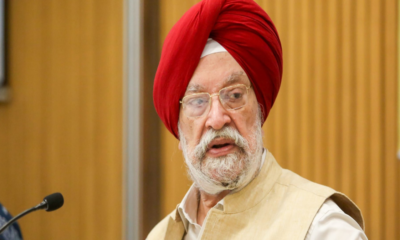[vc_row][vc_column][vc_column_text]By Rajesh Sinha
The Congress Working Committee (CWC) meeting today to discuss the party’s second successive humiliating defeat in Lok Sabha elections went along expected lines.
Congress president Rahul Gandhi offered to step down from his position. CWC rejected it unanimously.
Congress spokesperson Randeep Surjewala said the CWC has given its party chief Rahul Gandhi the right to make changes to restructure the party. He said that a plan for this will be brought soon.
The meeting was attended by UPA chairperson Sonia Gandhi, former prime minister Manmohan Singh, chief ministers of party-ruled states and other top leaders from across the country. Congress won just 52 seats in the 542-member lower house, up from 44 seats it had secured in its worst-ever performance in the 2014 general elections.
Rahul Gandhi, according to media reports, is adamant at quitting his post and has also told party leaders not to choose his sister Priyanka Gandhi Vadra to replace him. The unsaid part is the intention to counter the criticism of the party belonging to the ‘dynasty’.
The deliberations of the Congress always go along the same lines with similar decisions. It is a classic example of “doing the same thing over and over again and expecting different results”. It may not be insanity, as the quote, widely attributed to Albert Einstein, defines it, but it certainly depicts loss of organisational memory, lack of imagination, and laziness of thought translated into lack of action on the ground.
A day earlier, media reports said there have been voices within to introspect on why the party failed to reach out to the people. The Congress’s unprecedented slide has raised questions about both its future and the role of the Nehru-Gandhi family, which led the party through some of its most glorious days, said reports.
The most crucial aspect that needs to be fixed is missing in all the deliberations the party has held.
The party badly needs to put its organisation in order (or, as some would say, ‘build an organisation’ to begin with), work out a clear stand on social and political issues, and establish a connect with the people.
The BJP is the only party that engages with society in its political work which is complemented by its associated outfits in the RSS fraternity. They run schools, they organise functions, yatras, celebrate festivals, et al. Congress leaders hold only iftar parties, at the most.
The party needs to be in touch with what is happening in society – ‘feel its pulse’, so to say. This is sorely missing. The Congress does not only lack a social agenda to guide and lead the people, it is out of touch with them.
During Narendra Modi government first term, NDA-II, there were several occasions when different sections of people in different parts of the country held strong protest rallies and marches. All that energy went waste without Congress or any other opposition party tapping into it. Where was the Congress when people were getting lynched and ‘gaurakshaks’ were on rampage? What did it do when JNU students and the institution itself was targeted? Where was it when farmers protests – the strongest in decades – happened, and happened repeatedly? What did it do to organise or mobilise the lakhs of students and unemployed youth?
The Congress was unaware of their resentment till it was out in the open. The party didn’t have a clue any such issue existed. When the protests happened, the Congress issued statements expressing its support. But the party was never seen with the people, working on the ground. The support was confined to press conferences.
Congress spokespersons would issue a statement and the job was considered done. Sometimes, to express stronger support, the statement would come from Rahul Gandhi himself. That was the highest level of engagement with people and social issues.
This was not always the case with Congress. Congress workers would take out ‘prabhatpheris’ in which they would go out and meet/contact people in morning walks, hold ‘chaupal’ in villages and talk about social issues, social reform or politics. That was about three decades ago: a long long time.Now they are not to be seen anywhere. What stops the Congress from running schools and hospitals, theatre programmes, promoting artists, sportspersons, centres of wings to help resolve people’s problems? Just lack of imagination and thought.
The Congressalso needs to give up its reliance only on a leader at the top to build its political capital. In fact, from the time of Indira Gandhi onwards, the party has relied exclusively on a top leader to get votes. Everything is top-down.
This was brought out hilariously in an interview of Congress leader and Madhya Pradesh chief minister in The Indian Express:
“Q. To what do you attribute the rout the Congress suffered in Madhya Pradesh?
- An assessment will be made…I have not been in touch with Delhi yet.”
A state’s chief minister needs the party’s central leadership to tell him what went wrong, or approve his assessment.
This needs to change, and it has to go to the bottom of the party – even if this change is also ordered from the top.[/vc_column_text][/vc_column][/vc_row]


 Latest world news23 hours ago
Latest world news23 hours ago
 Latest world news23 hours ago
Latest world news23 hours ago
 Latest world news23 hours ago
Latest world news23 hours ago
 India News23 hours ago
India News23 hours ago
 India News14 hours ago
India News14 hours ago
 Latest world news14 hours ago
Latest world news14 hours ago













